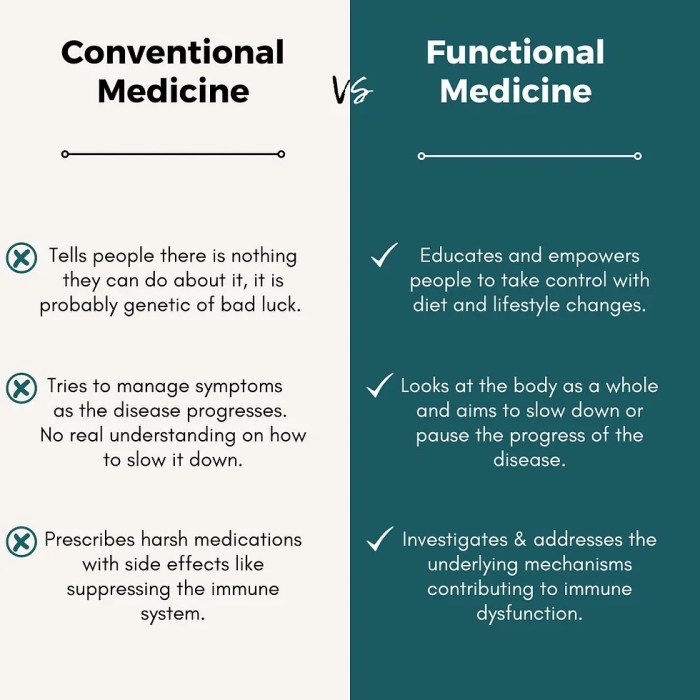Exploring the differences between Functional Medicine and Traditional Healthcare sheds light on contrasting approaches to patient care, diagnosis, and treatment. This comprehensive comparison delves into the core principles of each method, offering valuable insights into the world of healthcare.
As we unravel the distinct features of Functional Medicine and Traditional Healthcare, a deeper understanding emerges, showcasing the unique perspectives and methodologies that guide these practices in the medical field.
Definition and Approach

Functional medicine and traditional healthcare represent two distinct approaches to treating illnesses and promoting overall health. Functional medicine focuses on addressing the root causes of health issues by considering the interconnectedness of bodily systems, while traditional healthcare typically relies on standardized protocols for diagnosis and treatment.Functional medicine practitioners view the body as a complex and integrated system, aiming to identify and address underlying imbalances that may be causing symptoms.
This approach emphasizes personalized treatment plans tailored to individual patients based on factors such as genetics, lifestyle, and environment. Functional medicine also places a strong emphasis on preventative care and patient education.On the other hand, traditional healthcare follows more conventional practices, focusing on the diagnosis and treatment of specific symptoms or diseases using established medical protocols.
This approach often involves the use of pharmaceuticals or surgical interventions to manage symptoms without necessarily addressing the underlying causes of illness. Traditional healthcare typically operates within a framework of standardized guidelines and treatments based on evidence-based medicine.
Core Principles and Methodologies
- Functional Medicine:
- Personalized approach considering individual factors such as genetics, lifestyle, and environment.
- Focus on identifying and treating root causes of illness.
- Emphasis on patient education and preventative care.
- Integration of multiple healing modalities, including nutrition, lifestyle changes, and supplements.
- Traditional Healthcare:
- Standardized protocols for diagnosis and treatment.
- Focus on managing symptoms through pharmaceuticals or surgical interventions.
- Reliance on evidence-based medicine and established guidelines.
- Less emphasis on personalized care and addressing root causes of illness.
Diagnosis and Treatment Approaches
- Functional Medicine:
- Comprehensive evaluation of patient's health history, genetics, and lifestyle factors.
- Use of specialized testing to uncover imbalances or underlying causes of illness.
- Treatment plans focused on lifestyle modifications, nutritional interventions, and supplements.
- Emphasis on empowering patients to take an active role in their own health.
- Traditional Healthcare:
- Standard diagnostic procedures based on symptoms and medical history.
- Reliance on pharmaceuticals or surgical procedures to manage symptoms.
- Treatment plans guided by established medical protocols and guidelines.
- Less emphasis on lifestyle modifications or holistic approaches to health.
Patient Interaction and Focus

In functional medicine and traditional healthcare, the patient-provider relationship plays a crucial role in the delivery of care
Functional Medicine Patient-Provider Relationship
Functional medicine emphasizes a patient-centered approach, where the provider takes the time to understand the patient's unique health history, genetic makeup, lifestyle, and environmental factors. This in-depth assessment allows for personalized treatment plans tailored to the individual, fostering a collaborative relationship between the patient and provider.
Traditional Healthcare Patient-Provider Relationship
In traditional healthcare, patient care often follows a more standardized approach, with less emphasis on personalized care. Providers typically rely on established guidelines and protocols to diagnose and treat patients, leading to a more paternalistic relationship where the provider makes decisions for the patient rather than with them.
Treatment Methods
Functional medicine and traditional healthcare employ different treatment methods when addressing chronic conditions. In functional medicine, the focus is on identifying and addressing the root cause of the illness rather than just treating symptoms. This approach often involves a combination of lifestyle changes, dietary modifications, supplements, stress management techniques, and alternative therapies.
Use of Pharmaceuticals in Traditional Healthcare
In traditional healthcare, the primary treatment modality for chronic conditions is the use of pharmaceuticals to manage symptoms. Medications are prescribed to alleviate pain, reduce inflammation, lower blood pressure, or regulate blood sugar levels. While pharmaceuticals can be effective in providing symptomatic relief, they do not necessarily address the underlying cause of the condition.
Focus on Lifestyle Changes in Functional Medicine
On the other hand, functional medicine emphasizes the importance of lifestyle modifications in treating chronic conditions. Patients are encouraged to adopt healthy habits such as regular exercise, balanced nutrition, adequate sleep, and stress reduction techniques. By making these lifestyle changes, individuals can improve their overall health and well-being, leading to long-term benefits beyond just symptom management.
Addressing Chronic Conditions
- In traditional healthcare, chronic conditions like diabetes, hypertension, and high cholesterol are typically managed with medication to control symptoms and prevent complications. For example, a patient with diabetes may be prescribed insulin or oral medications to regulate blood sugar levels.
- In functional medicine, the approach to managing chronic conditions involves identifying the underlying factors contributing to the illness. For instance, a patient with autoimmune disease may be advised to follow an anti-inflammatory diet, reduce stress levels, and incorporate supplements to support immune function.
Holistic vs. Conventional
Functional medicine takes a holistic approach to healthcare, focusing on treating the root cause of illnesses rather than just managing symptoms. This approach considers various factors such as genetics, lifestyle, environment, and emotional well-being to create personalized treatment plans for patients.
Holistic Nature of Functional Medicine
Functional medicine practitioners aim to understand the underlying imbalances in the body that lead to disease. By addressing these root causes, they can help patients achieve long-term health and wellness. This approach often involves looking beyond physical symptoms and considering the interconnectedness of different bodily systems.
- Functional medicine may involve extensive testing to uncover underlying issues that traditional healthcare might overlook.
- Treatment plans in functional medicine often include lifestyle modifications, dietary changes, stress management techniques, and supplements to support the body's natural healing processes.
- Practitioners of functional medicine work collaboratively with patients to empower them to take an active role in their own health and well-being.
Focus on Symptom Management in Traditional Healthcare
Conventional healthcare, on the other hand, typically focuses on managing symptoms rather than addressing the root cause of illnesses. This approach often involves prescribing medications to alleviate symptoms without necessarily resolving the underlying issues.
- Traditional healthcare may rely heavily on standardized treatment protocols that do not always consider the individual needs of patients.
- Patients in traditional healthcare settings may receive medications to mask symptoms without addressing the underlying cause of their health issues.
- There is often less emphasis on preventive care and lifestyle modifications in traditional healthcare compared to functional medicine.
Final Wrap-Up
In conclusion, the debate between Functional Medicine and Traditional Healthcare unveils a complex landscape of healthcare delivery, emphasizing the importance of personalized care and holistic wellness. By examining these contrasting paradigms, we gain a richer perspective on the diverse options available in the realm of healthcare.
FAQ Summary
How does Functional Medicine differ from Traditional Healthcare?
Functional Medicine focuses on addressing the root cause of illnesses through personalized treatment plans, while Traditional Healthcare often emphasizes symptom management with standardized protocols.
What treatment methods are commonly used in Functional Medicine?
Functional Medicine employs a variety of modalities such as nutrition, supplements, lifestyle changes, and stress management techniques to promote holistic healing.
How does patient interaction differ between Functional Medicine and Traditional Healthcare?
Functional Medicine emphasizes a patient-centered approach, fostering a deeper connection between patients and providers, whereas Traditional Healthcare typically follows a more standardized patient care model.
Can you provide examples of chronic conditions addressed by Functional Medicine and Traditional Healthcare?
Functional Medicine often addresses conditions like autoimmune disorders, hormonal imbalances, and digestive issues, while Traditional Healthcare commonly treats chronic conditions with pharmaceutical interventions.









